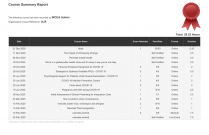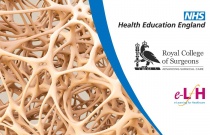Thromboprophylaxis in the Critically Ill
Louise Tillyer
0.50 Hours
This session outlines the risk factors for venous thromboembolism (VTE) in critically ill patients and reviews the different methods (pharmacological and non-pharmacological) available for prophylaxis.
Dying in Intensive Care
Karen Frame and Maribel Manikon
This session uses a case history to examine some of the challenges in providing end of life care in intensive care units (ICUs). Determining the appropriate ceiling of intervention, changing the focus of care from cure to comfort, communication issues, supporting patients and families and pain and symptom control issues will be....
The Use of the Contraceptive Injection
Alison Swain and Philippa Matthews
0.50 Hours
This session addresses safe provision of the contraceptive injection including pre-method discussion and management of patients returning for the contraceptive injection.
Testosterone Deficiency and Male Hypogonadism
Chantal Simon
0.50 Hours
Many men experience a gradual decline in bioavailable testosterone with age. It is associated with osteoporosis, diabetes, heart disease, depression and cognitive decline. This session provides an overview of investigation and management. This session was reviewed by Paresh Dawda and last updated on 28/02/13.
Systematic Incident Investigation
Jane Carthey Patient Safety and Human Factors Specialist and Christine Johnson General Practitione
0.50 Hours
This session describes the use of Root Cause Analysis tools to systematically investigate patient safety incidents in general practice. Examples to improve your understanding of how to apply these tools appropriately are provided.
Social Development
Deborah Christie
0.50 Hours
This session will review the reciprocal impact of changes in social development in adolescence. The session will also consider what impact these developmental changes have on self management of long-term illness during adolescence.
Syncope: Guidelines and Treatment
Sunil Kumar
0.50 Hours
This session explains the European Society of Cardiology guidelines on the investigation and management of syncope.
Ulcerative Colitis: Investigation and Management
Jeff Turner
0.75 Hours
This session considers the initial clinical presentation, appropriate radiological and endoscopic investigations, differential diagnoses and management of patients with ulcerative colitis.
Spinal Cord Compression
Imtiaz Shah
0.50 Hours
This session covers the clinical presentation, investigation and management of spinal cord compression.
Symptom Management Complicated by Coexisting Conditions in Palliative Care
Shaheen Khan
0.50 Hours
This session outlines some of the considerations to be taken into account when symptom management is complicated by coexisting conditions. This session was reviewed by Amy Proffitt and Christina Faull and last updated in December 2015.
Why do People Consult
Andrew Shanks
This session will introduce some psycho-social ways of thinking about different influences on consulting behaviour. You will be asked to reflect on your own experiences.
Shockingly Powerful: Electrotherapy for Strength Training
Industry Specialists
0.25 Hours
This introductory level course offers clinicians utilizing electrotherapy with knowledge to maximize treatment outcomes from the use of electrotherapy in the rehabilitation of patients with muscle weakness. The presentation of muscle weakness and disuse atrophy will be discussed and model will be presented to address this weakne....
Treating and Managing Dysphagia with Dementia II
Peter Johnson
0.25 Hours
Treating and Managing Dysphagia with Dementia is a two part series for physical therapists, occupational therapists and speech-language pathologists. Each part may be taken independently. This series focuses on the variables associated with cognitively impaired patients, dysphagia instruction and memory functions necessary for l....
Tissue Donation, Procurement and Whole Organ Transplantation
Anand Muthusamy
0.50 Hours
This session outlines principles of organ and tissue transplantation, focusing on two aspects: organ donation and recipient selection for transplantation. Highlights include: transplant terminology, UK legislation, organ procurement process, consent guidelines, and recipient selection criteria.
Thoracic Aortic Aneurysms
Peter Gaines
0.50 Hours
This session will cover the aetiology, natural history, treatment options and outcome of thoracic aortic aneurysms.
Thrombolysis and Thrombectomy
Sam Chakraverty
0.50 Hours
This session covers the use of thrombolysis and thrombectomy in the peripheral circulation to clear occlusions.
The Failing Dialysis Fistula
Sam Chakraverty
This session covers the role of interventional radiological management of failing haemodialysis fistulas.
SCIWORA: Spinal Cord Injury Without Radiographic Abnormality
Miny Walker
0.50 Hours
This session will explain the term SCIWORA syndrome, describe the clinical groups susceptible to this type of injury and illustrate the imaging of SCIWORA, concentrating on magnetic resonance (MR) appearances.
Stroke: Where is the Lesion?
Ahamad Hassan
This session presents principles of arterial anatomy based on clinical presentation of stroke.
The role of the open abdomen procedure in managing severe abdominal sepsis: WSES position paper
Industry specialists
0.50 Hours
The open abdomen (OA) procedure is one of the greatest surgical advances in recent times and may have enormous application in the daily management of critically ill surgical patients. The OA may be a useful option for treating patients with abdominal sepsis. However its precise role in these patients is still not clear. On the b....
Toxic Shock Syndrome in Patients with Burns
Sarah Chadwick and Mamta Shah
0.50 Hours
This session describes the clinical features of toxic shock syndrome in burns and identifies those patients at greatest risk. Later sections offer guidance on the treatment of toxic shock syndrome and explore the role of prophylactic antibiotics.
Trauma and Orthopaedics: Osteoarthritis Hip
Chris Wakeling
This session aims to provide an introduction to the pathological process of osteoarthritis, along with its effect on and the treatment options around the hip joint.
Trauma and Orthopaedics: Metastatic Bone Disease
James Houston
This session details the different types of metastatic bone disease, the treatment options available and when prophylactic surgical stabilisation may be indicated.
Skin Head and Neck Upper Airway Obstruction
Mohammed Bahgat
0.50 Hours
This session discusses the causes and diagnostic approach of head and neck upper airway obstructions.
























